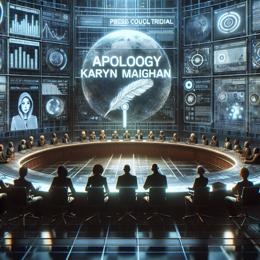Image created by AI
Press Council Ruling Challenges Editorial Integrity of Sekunjalo-Owned Publications
The South African media landscape was confronted with a significant Press Council ruling, shaking the foundations of editorial integrity among the Sekunjalo-owned newspapers. The case revolved around an article by Edmond Phiri, published on March 3, 2024, in the Sunday Independent, which implicitly compared journalist Karyn Maughan to Nazi propagandist Leni Riefenstahl.
The virtual hearing, clouded by the mysterious absence of Phiri's visual presence, culminated in a hard-hitting verdict on August 6, 2024. The panel upheld the complaint lodged by News24 and Maughan, citing two breaches of the Press Code: clauses 3.3 and 2.1, which pertain to exercising care with dignity and reputation, and preventing non-professional considerations from influencing reporting, respectively.
This incident casts Sekunjalo-owned publications in a dubious light regarding their editorial decision-making process. Independent titles, including IOL, Pretoria News, The Star, Mercury, Daily News, Cape Times, and Cape Argus, along with the chairman of Sekunjalo, Iqbal Survé, were implicated in the dissemination of the offending article. The ruling outlined that the newspapers permitted corporate interests to overshadow journalistic integrity, calling for a retraction and apology to Maughan.
Notably, the Press Council also had to navigate procedural challenges, including whether the complaint should be accepted and Media Monitoring Africa's (MMA) role as amicus curiae. The panel decisively dealt with these matters, focusing on the essence of the complaint. They concluded Phiri's article did not merit the protection typically afforded under clause 7.2 of the Press Code because of its unsubstantiated claims and thinly-veiled attacks.
The panel's findings were stark, illuminating how the Sekunjalo-owned titles had potentially compromised editorial decisions to align with corporate interests, thus breaching media ethics. This scrutiny is essential in the context of ensuring a free and fair press, untainted by ulterior motives. It reinforces the critical role of watchdog entities like MMA and the Press Council in safeguarding the pillars of independent journalism.
Just days after the decision, Sekunjalo's response was to lash out at the Press Council, alleging bias and describing the ruling as a threat to press freedom. Their forthcoming appeal, expected by August 16, 2024, will mark the next chapter in this contentious dialogue on media ethics and transparency in South Africa.










